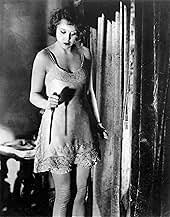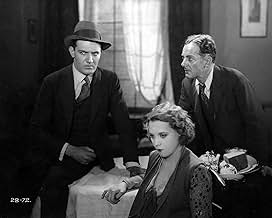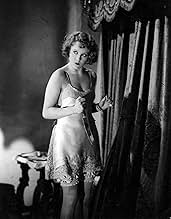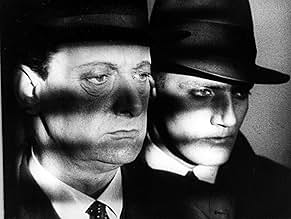IMDb RATING
6.9/10
13K
YOUR RATING
After killing a man in self-defense, a young woman is blackmailed by a witness to the killing.After killing a man in self-defense, a young woman is blackmailed by a witness to the killing.After killing a man in self-defense, a young woman is blackmailed by a witness to the killing.
- Awards
- 2 wins total
Ex-Det. Sergt. Bishop
- The Detective Sergeant
- (as Ex-Det. Sergt. Bishop - Late C.I.D. Scotland Yard)
Johnny Ashby
- Boy
- (uncredited)
Joan Barry
- Alice White
- (voice)
- (uncredited)
Johnny Butt
- Sergeant
- (uncredited)
Alfred Hitchcock
- Man on Subway
- (uncredited)
Phyllis Konstam
- Gossiping Neighbour
- (uncredited)
Sam Livesey
- The Chief Inspector (silent version)
- (uncredited)
Phyllis Monkman
- Gossip Woman
- (uncredited)
Percy Parsons
- Crook
- (uncredited)
Featured reviews
One of Hitchcock's early films, it was one of the first films to come out of England with sound during the end of the silent film era. An interesting film, we see several great shots of dolly's with the early staircase scene. Several well shot montages with wonderful dissolves and sound bridges. For 1929, Hitchcock shows the world with the film that he's a talented film maker. A risky scene, the audience gets to watch the main actress of the film undress behind her curtains. While the murder is never seen, the provocative and private scene of her undressing is present. Another interesting note, the main character of the film is the murderer! Throughout the film, the audience judges whether or not she is an innocent murderer or a killer. Hitchcock makes an early name for himself with this film with toying with the audience throughout the suspense of the film.
Alfred Hitchcock's first talkie is an intriguing film, not entirely successful but still more enjoyable than some of the other films Hitch made around this time. The story starts with a woman cheating on her boyfriend, a Scotland Yard detective. When the man she's with tries to rape her, she kills him in self-defense. Afterwards a criminal who pieces it together blackmails her and her detective boyfriend.
A little creaky but that's to be expected under the circumstances. The film started out being made as a silent before it was decided to turn it into a sound picture. In spots it reverts back to a silent (without intertitles). This actually works in the film's favor. There are some really nicely done lengthy sequences with no dialogue, such as her walk home after she's killed the guy, punctuated by a scream. Good acting all around. Nice direction from Hitch. The museum climax is excellent; an early example of the defining set pieces that would become a Hitchcock trademark. Definitely worth a look if you're a fan. Or even if you're not, provided you enjoy pictures from this period. Not everyone does, unfortunately.
A little creaky but that's to be expected under the circumstances. The film started out being made as a silent before it was decided to turn it into a sound picture. In spots it reverts back to a silent (without intertitles). This actually works in the film's favor. There are some really nicely done lengthy sequences with no dialogue, such as her walk home after she's killed the guy, punctuated by a scream. Good acting all around. Nice direction from Hitch. The museum climax is excellent; an early example of the defining set pieces that would become a Hitchcock trademark. Definitely worth a look if you're a fan. Or even if you're not, provided you enjoy pictures from this period. Not everyone does, unfortunately.
While remembered as the first sound picture made by Alfred Hitchcock (or anyone else in Britain), there is much more to "Blackmail" than merely historical interest. It reveals the director's subtle creativity, with a carefully structured story that also produces some real suspense, with one of Hitchcock's best cameos and an entertaining chase sequence as bonuses. The movie has a unique feel, as Hitchcock was still using many silent film techniques at the same time that he was experimenting with sound. Not all of this works perfectly, but it does not detract from the film's many positive features.
Alice White (Anny Ondra, voice dubbed by Joan Barry) goes out for the evening with her boyfriend, who is a police detective (John Longden). When they have a series of minor quarrels, Alice decides to go her own way, and meets an artist friend. The artist's intentions are obvious, but Alice is innocently unaware. When he brings her to his studio, there is soon an unpleasant confrontation that sets in motion a turbulent series of events.
The story is carefully constructed not just to produce suspense but also to raise interesting questions in the viewer's mind. Alice feels a terrible sense of guilt and fear over what has happened - communicated to the viewer in a variety of creative ways - but of what is she really guilty? The behavior of the detective boyfriend is partly well-intentioned, but he certainly is not faultless. The moral ambiguity is often subtle, because it takes a back seat to the suspense, and it takes a couple of viewings to appreciate all that is going on.
There is a particularly nice symmetry to the beginning and ending, pointing to the greater significance of the action in between. The opening sequence (filmed in silent movie style) shows the detective and his partner dealing with a suspect in a routine way, not caring about him as a person. In the final scenes, when the detective must help Alice make a final report on everything that has happened, he sees his job in a far different perspective.
"Blackmail" is of the darker type of Hitchcock, like "Notorious" or "Vertigo". While clearly made in a different era, it has the same kind of depth and craftsmanship that distinguished those later, more well-known masterpieces.
Alice White (Anny Ondra, voice dubbed by Joan Barry) goes out for the evening with her boyfriend, who is a police detective (John Longden). When they have a series of minor quarrels, Alice decides to go her own way, and meets an artist friend. The artist's intentions are obvious, but Alice is innocently unaware. When he brings her to his studio, there is soon an unpleasant confrontation that sets in motion a turbulent series of events.
The story is carefully constructed not just to produce suspense but also to raise interesting questions in the viewer's mind. Alice feels a terrible sense of guilt and fear over what has happened - communicated to the viewer in a variety of creative ways - but of what is she really guilty? The behavior of the detective boyfriend is partly well-intentioned, but he certainly is not faultless. The moral ambiguity is often subtle, because it takes a back seat to the suspense, and it takes a couple of viewings to appreciate all that is going on.
There is a particularly nice symmetry to the beginning and ending, pointing to the greater significance of the action in between. The opening sequence (filmed in silent movie style) shows the detective and his partner dealing with a suspect in a routine way, not caring about him as a person. In the final scenes, when the detective must help Alice make a final report on everything that has happened, he sees his job in a far different perspective.
"Blackmail" is of the darker type of Hitchcock, like "Notorious" or "Vertigo". While clearly made in a different era, it has the same kind of depth and craftsmanship that distinguished those later, more well-known masterpieces.
I have seen most of Alfred Hitchcock's films, silent and talking, and was saving this one for a special occasion. It was really quite good and although over-rated despite being cited so often (along with Mamoulian's "Applause") as a successful example of the transition between the silents and talkies in all the references I've consulted, it still has some distinct good qualities of its own. Annie Ondra is an excellent silent actress and this among several other films proves it. Her accent was very strong, of course, and employing Joan Barry to "lip-synch" was genial. Francois Truffaut's interviews with Hitchcock about working with Ms Ondra were enough to stimulate anyone's appetite to see her (and to hear Joan Barry) at work. The music - at least in the beginning - is excessively burdensome and "busy" and frankly irritating. However, when the characters finally began dialogue, it calmed down considerably and actually worked out well until the ending. We're seeing a hybrid here: a talkie and a part-talkie. When the talking itself finally happens, the characters aren't even facing the camera but are photographed from behind! This is the famous Hitchcock we know and love in the heat of action. The view of the staircase is very Hitchockian as in "Vertigo" or "Psycho" as well as the chase in a public monument (North by Northwest" comes to mind). Yes, the director made the move to talking pictures quite fluently and fluidly. One should keep in mind, too, that the film had already been completed as a silent before being converted into a talkie! All the more to admire...
Curtis Stotlar
Curtis Stotlar
Hitchcock's Blackmail might have been a total train wreck in the hands of a lesser talent. Instead, it is a remarkable piece of cinematic history, and still tremendously entertaining after 78 years. The film was partly shot when Hitchcock learned that he would have access to sound equipment. His female lead was a talented German silent picture actress, whose accent was too heavy for sound, so an off-camera reader had to be used, plus a decent amount of expensive film had already been used and had to be integrated into the 'talkie' as well.
All considered, the movie is probably the best example of the transition from these two cinematic paradigms that can be found.
The silent portion of the film establishes John Longden's character as a hard-nosed young Scotland Yard detective. Anny Ondra plays the lovely young lady who is engaged to him,and who soon becomes the center of our attention. One night after they argue over some petty matters, they part company and Anny meets up with a male artist friend, who, unbeknownst to her, is interested in more than just pleasant conversation. Frank (Longden) spots them leaving the restaurant and follows them for a while. The artist coaxes Alice (Ondra) up to his flat, and things take a sinister turn in short order.
Over the second half of the film, the plots unfolds, and the emotions and consciences of the protagonists are sorely tried.
What immediately blew my mind was what a great silent director Hitchcock was. Shouldn't have been too surprising since Hitchcock has always struck me as a master cinematographer. The first 20 minutes of the film are completely silent,and there are no interruptions from distracting story boards. Nevertheless, through incredible use of lighting, camera work, and evocative acting, you understand everything that is going on clearly, and are drawn straight into the edgy atmosphere so familiar to those who appreciate the work of this great director.
The acting is mostly very good. Only Longden sometimes seems to over or under-act his part, and Ondra is really wonderful all the way through. I was not surprised to learn of her lengthy and productive career both before and after this film and will now look for more of her work.It is also interesting to see how the actors adapted so readily to the new medium. Although some have said that the sound portion of this film seemed over-acted because the actors were still clinging to silent film conventions, I really can not agree. Some of the characters (Alice, for example) required very evocative, rather physical performances, and I can't imagine how she could have done better.
Highly recommended for the amazing photography, exceptionally professional though very early use of sound, and the typically perfect pace.
All considered, the movie is probably the best example of the transition from these two cinematic paradigms that can be found.
The silent portion of the film establishes John Longden's character as a hard-nosed young Scotland Yard detective. Anny Ondra plays the lovely young lady who is engaged to him,and who soon becomes the center of our attention. One night after they argue over some petty matters, they part company and Anny meets up with a male artist friend, who, unbeknownst to her, is interested in more than just pleasant conversation. Frank (Longden) spots them leaving the restaurant and follows them for a while. The artist coaxes Alice (Ondra) up to his flat, and things take a sinister turn in short order.
Over the second half of the film, the plots unfolds, and the emotions and consciences of the protagonists are sorely tried.
What immediately blew my mind was what a great silent director Hitchcock was. Shouldn't have been too surprising since Hitchcock has always struck me as a master cinematographer. The first 20 minutes of the film are completely silent,and there are no interruptions from distracting story boards. Nevertheless, through incredible use of lighting, camera work, and evocative acting, you understand everything that is going on clearly, and are drawn straight into the edgy atmosphere so familiar to those who appreciate the work of this great director.
The acting is mostly very good. Only Longden sometimes seems to over or under-act his part, and Ondra is really wonderful all the way through. I was not surprised to learn of her lengthy and productive career both before and after this film and will now look for more of her work.It is also interesting to see how the actors adapted so readily to the new medium. Although some have said that the sound portion of this film seemed over-acted because the actors were still clinging to silent film conventions, I really can not agree. Some of the characters (Alice, for example) required very evocative, rather physical performances, and I can't imagine how she could have done better.
Highly recommended for the amazing photography, exceptionally professional though very early use of sound, and the typically perfect pace.
Did you know
- TriviaMuch of the filming originally was shot silently. When sound became available during the course of shooting, Sir Alfred Hitchcock reshot certain scenes with sound, thus making it his first talkie. There was one complication with this change, however. Leading lady Anny Ondra had a thick Czech accent which was inappropriate for her character, Alice White. Joan Barry was chosen to provide a different voice for her, but post-production dubbing technology did not exist then. The solution was for Barry to stand just out of shot and read Alice's lines into a microphone as Ondra mouthed them in front of the camera. [This is a major plot point of Chantons sous la pluie (1952), which is set in the era of movie studios moving from silent pictures to talkies.] This generally is acknowledged as the first instance of one actress' voice being dubbed by another, even though the word "dub" is technologically inappropriate in this case.
- GoofsAt about 0:24:30 when Crewe (Cyril Ritchard) is talking to Alice (Anny Ondra), he calls her "Anny" before correcting himself.
- Quotes
Alice White: You and your Scotland Yard! If it weren't for Edgar Wallace, no one would ever have heard of it.
- Alternate versionsOriginally filmed as a silent movie, running 75 minutes; Hitchcock later added newly shot scenes and had other existing footage dubbed to create a talkie version, running 86 minutes.
- ConnectionsEdited into Der Zinker (1931)
- SoundtracksMiss Up-to-Date
(1929) (uncredited)
Words by Frank Eyton and music by Billy Mayerl
Performed by Cyril Ritchard
Details
Box office
- Gross worldwide
- $160
- Runtime
- 1h 25m(85 min)
- Color
- Aspect ratio
- 1.20 : 1
Contribute to this page
Suggest an edit or add missing content


































